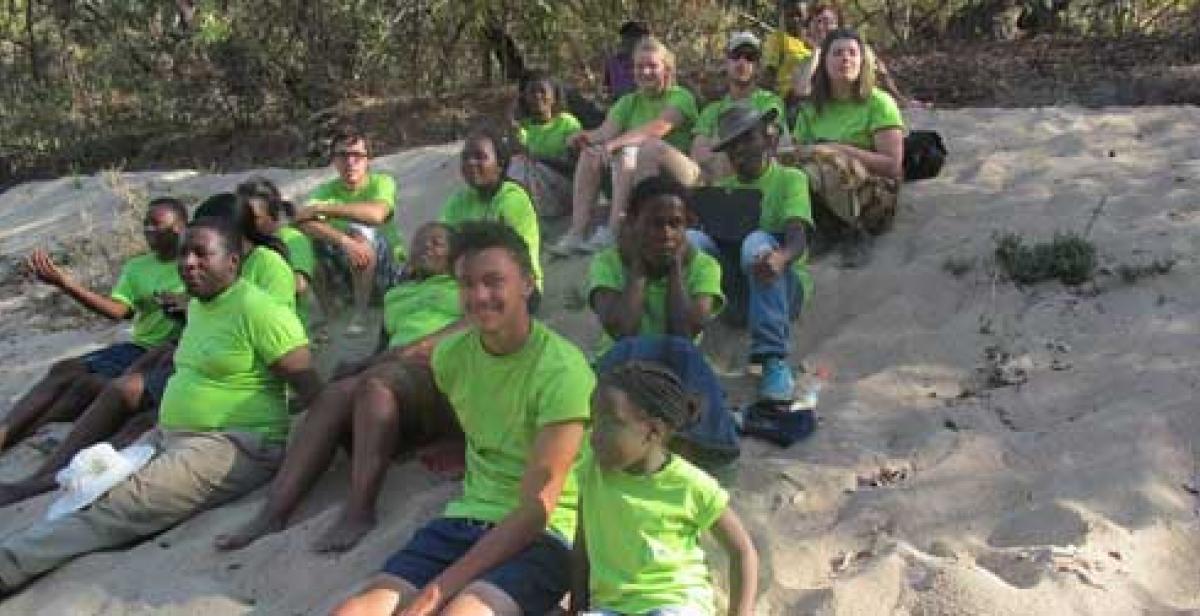With a million stars in the sky to marvel at, both the national and the international volunteers felt at home the moment we stepped on the sands of the village called Bezha/Nyololo . As if that was not enough the moment we entered one of the huts in the homestead we knew that the cultural exchange had already begun. Served with a dish of African food called ‘inkobe’ and a metal cup filled with warming tea ,we all knew that the cultural boundaries were slowly but surely being broken down.
Everyone just could not wait to take a nap under the roof of a grass thatched hut. After having been offered a room with a bed and a corrugated metal roof to sleep in, people proved to be ever zealous to adjust to the rural way of life by denying the luxury. Instead, the grass thatched kitchen without a sign of a bed in it but only the black shiny floor seemed the most comfortable bedroom to go for after the 80kms journey! Grass mats were our beds for the night, and everyone soundly slept like a baby.
“As the sun rises everyone has to rise to duty“, that’s the way for rural life. Our international friends seemed well equipped with every tool to fit into the African culture. All girls wrapped themselves in long African materials ‘chitenges/ zambias ‘ and everyone became an African woman. We worked as a team to complete all the duties that everyone in the rural area does. Having to carry a 20 litre bucket filled with water on the head turned out not to be an easy task as it seemed; “straining and painful” are the words to describe it. Our international friends though not used to the practice of carrying water on their heads seemed eager to have a feel of how it felt like, yet the nationals on the other side showed off their expertise of being able to balance the heavy buckets on their heads without inconvenience.
Cooking on the fire! “An emotional task” as described by one of the international volunteers as tears fell down his eyes due to the smoke. Everyone had to get the feel of cooking sadza in a 3 legged aluminium size 6 pot. Taking turns to stir the sadza until it was ready to serve became fun rather than a task.
The trees wept for mercy as the male volunteers took turns in cutting down a tree which was to provide firewood for the day. No matter how tiring the task seemed to be, all the boys concluded that ‘It was good fun!’ The axe was passed from one person to the other until the tree mercilessly fell crumbling down. Having successfully managed to bring down the tree it became awesome to the ladies who praised the gentlemen’s strength and energy. From thence forth nothing seemed impossible for the competent young men.
All the boys and men took the most outrageous task of having to slaughter the goat for the meat. As the goat wrestled for its life it became pointless as the sadza was ready and meat had to be provided. Everyone passed the test of ‘goat slaughtering’ as the ladies received a dish filled with goat meat ready to cook.
The homesteads were quite scattered yet organised. Hills everywhere, trees of different fruits such as mangoes, oranges, lemons etc. the village was an awesome sight. Having to walk on the heavy sands in the village forced some to take off their shoes thus making the walk more interesting. Fitting into the community became ‘no hard task‘as the traditional greeting of saying, “Salibonani…“was no tongue-tier for our international volunteers thus further ‘breaking the cultural boundaries.‘
After having the most memorable cultural exchange no one wanted to think of having to go back to the city. Though with every reason to stay a bit longer than intended there was no option in sight than to pack our bags and wave goodbye to the opportunity of breaking cultural boundaries, yet with triumph in our hearts for all that we had managed to cover for that short period of time we waved goodbye.
Written by ICS volunteers



